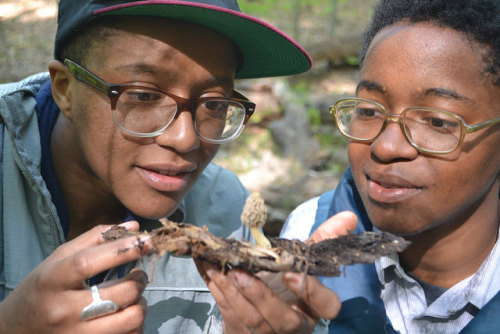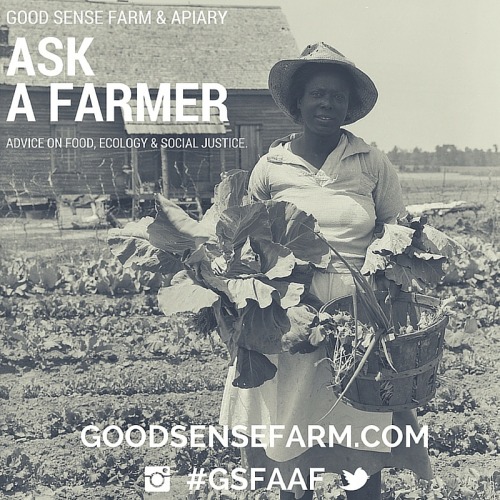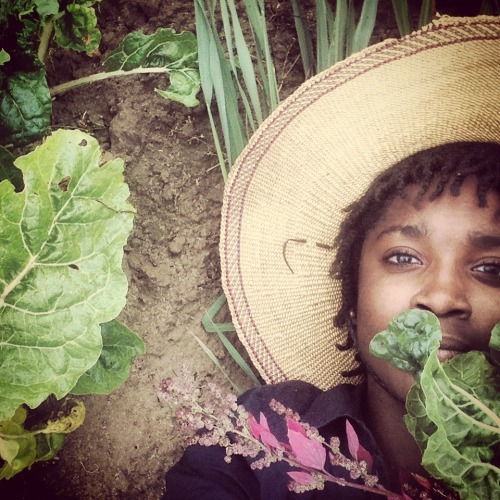#cooperative economics
“I had a weird curiosity about something that seemed forbidden,” they mused.
@farmaid wrote about us for their “Farm Heroes” blog series discussing the road to farming, family stories and cooperatives. Read more here.
Post link
The inaugural edition of Good Sense Farm’s “Ask a Farmer” column begins with a familiar question and ends with a twist. First the question, sent by someone who found out about us on the internets :
Good morning,
I…am on the quest to find black owned business to support for my life needs and wants. I have been very successful as now I have several DMV black farmers to support; however, I am having a hard time finding animal farmers for chicken/eggs, pork, etc. Can you direct me to local farmers or a black owned butcher shop that sources from Black Owned farms?
Thank you for any guidance you can provide. I look forward to supporting you and the rest of the agricultural farmers in the area.
J
I read this question through once and thought to myself, “how do I break it to them?” Here’s myfirst answer, unedited, untouched by the gift of hindsight.
Hey J,
Thanks for your inquiry. This is a great question.
While I truly wish it was a matter of just pointing you in the direction of a directory or list of black farmers to meet your needs, unfortunately it’s not that easy anywhere in the country. Access to the type of land that it takes to run an animal operation is a major obstacle on the farming front and urban development which supports small businesses like that black butcher that we both so earnestly want, just aren’t there and require real work to bring those resources back to our community. DC, like the rest of the country, has a really rich history of innovative black food producers but also a really deep legacy of structural inequity and intentional discrimination that make maintaining a business very difficult for black farmers and food producers.
As a result, producers are largely small and unconnected to larger markets. When they do reach larger markets you can’t distinguish their products from white producers. There has only recently been a resurgence in interest in the distinction in a way that might make it profitable for the producer. That’s why I am so happy that you asked this question! It’s proof that people want to know their black farmer a little better and are perhaps willing to invest directly in the growth of black farms to turn the current trends around.
Though I’m not sure how you came upon my information, I hope that in your search you heard about our work building a network of supportive infrastructure for farmers of color and connecting them to markets. Good Sense Farm cofounded Community Farming Alliance for DMV farmers of color in 2013 which is steadily building a network of farmers of color and resources to help them thrive.
Currently, we run a Community Supported Agriculture Program which offers, veggies, mushrooms, honey, medicinal herbs and, yes, eggs to our members.
We are always looking for more farmers to add to the network, particularly those with products that we know our customers want. We are also actively trying to mentor young farmers of color to get into the business and provide them with the resources to be successful. My hope is that folks like you will consider joining us and will spread the word that supporting cooperatives like ours is the best way to support the return of black artisinal producers outside of pushing for radical structural changes toward justice and equity in the food system.
I hope this information is helpful to you in your search and that, perhaps, we will meet soon. Your enthusiasm and earnest investment in our growth as food producers is appreciated and needed.
Best,
Zachari J. Curtis
I hit send, and didn’t think much more of it. J responded unsurprised. We shared hopes for a someday fix. We made pledges to meet real soon and that was that, or so I thought.
Nothing in my response was untrue but something kept bothering me about it. No, it wasn’t the self-promotional tone, though, you know.
In a recent email, my comrade in farming Gail Taylor, cofounder with me of Community Farming Alliance, lifted up an experience that made me reflect again on my response and the side of the story that doesn’t get told. Gail’s reflection on meeting Jahi Ellis, at a meeting of SAAFON: the Southeastern African American Farmer’s Organic Network.:
Like many of you, I had read the article about Ellis in [Civil Eats] that talks about how he’s in survival mode and struggling to make ends meet. What I think the article missed, which was clear when I met him last week, is how inspiring, capable, and determined Ellis is.
And there it is folks. Before you call it over for black farmers, we must all consider a few things. We have survived and come to thrive under tremendous pressures. We honor those who have not survived by keeping their names and their lessons in our minds and mouths. Our networks of resilience are not readily searchable and were not meant to be. We, like other folks, have resisted surveillance and traceability to create safe havens for our art, industry and livelihoods.
The world hasn’t changed that much since there was a need for mutual aid organizations and financial and business institutions that appeared on the outside like social clubs. Jessica Gordon Nembhard, community organizer and researcher, catalogs the atmosphere in which black communities fomented some of the most progressive economic institutions known in our history and our legacy of strategic collective resource sharing. Her book Collective Courage: A History of African American Cooperative Economic Thought and Practice, remembers the practices and institutions which black communities cultivated for their collective welfare.
From collective manumission to black labor unions, these institutions and practices promoted economic solidarity and provided the financial resources for radical social change movements of the time. Black coops were not just doing business, they were bailing people out, raising money for land and creating jobs for disposed members of the struggle. Talk about #FUNDBLACKFUTURES. Hear Jessica talk about the dangers, toils and snares.
Get Collective Courage and Join the Collective Courage Wisdom Circle.
Nembhard also dedicates a significant portion of the book and her work to talking about current emergent strategies that are a part of that legacy of resilience. Translation: we’re still in the game today and visibility isn’t the only measure of value. These systems of protection are not unique to black communities but they are purposeful and driven by data. I thought about this, reflected on everything I knew and kicked myself for telling the old story–the one about complete eradication, forced subversion and invisibility the end.
So what does that mean for me, someone fielding a question about the existence of black farmers/butchers/artisans? It means that I was offered the rare opportunity to tell the whole story and so I must. Hence my revision of my answer to the “Where are all the black farmers/butchers?” question.
I honestly know quite a few folks who are leading the way and who have taught me a lot about the business. They have their own ways of engaging communities around their work. I will try to share what I know Here’s what I know about where to get some meat raised, slaughtered and sold by black sustainable farmers and leave space for what I don’t know.
Black Meat Farmers near DC…an addendum
Market Poultry - Eastern Market, SE, DC

Longtime vendors at the reknown year-round artisinal market, Market Poultry specializes in fancy poultry and game birds. When I called (because I had to) a lovely sweet sounding voice is what you hear on the voicemail line. Most likely, it’s someone’s favorite aunt who can probably give you a recipe for roasted pheasant that will make you cry. Just saying. More information about Market Poultry here.
Thorne Farm - Westminster, MD

Greg Thorne is a native of Howard County, Maryland. His family has lived there since at least the mid 1800’s. His great grandparents and other family members owned several small farms in the West Friendship area, so farming is in his blood. His grandfather was an avid gardener while Greg was growing up, and taught him well. After being born in Boston and spending my early childhood in Michigan, I grew up in the Maryland suburbs, but always wanted to live on a farm.
Thorne and his wife, Kris, raise sheep for wool and meat in addition to growing veggies. Greg’s specialty is “wool with character” which means it doesn’t look like the stuff you get at the big box craft outlet. They sell at farmers markets in their area so if you don’t live nearby consider taking a roadtrip and pick me up a side of mutton and some sweetbreads (kidneys - yeah that’s how I get down. #teamorganmeats). I met Greg at a farmer of color gathering last year and was so struck by his positivity and the legacy of his farm.
Rainbow Hill Farm- Charles Town, WV
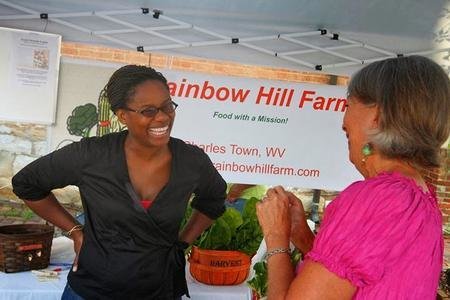
Farmer Gale Livingstone (different Gale than mentioned above) was born in Georgetown, Guyana and moved to Brooklyn, New York in 1981 as a child to live with her family. In 1991, Gale moved to the DC Metro area where she lived until 2010. Prior to owning Rainbow Hill Farm, Gale grew vegetables in containers on her deck and rented space with a community gardening program in Maryland to feed her love of farming. Gale’s passion for food motivates her to grow the freshest vegetables possible and stay committed to being self-sustaining and environmentally responsible.
Gale’s farm is certified organic and produces some of the best eggs on the east coast (yeah, I said it). We carried Gail’s eggs in our 2015 Cooperative CSA box and look forward to a long happy relationship with this super dedicated farmer.
Vanguard Ranch- Luisa, VA

Renard and Chinette Turner run Vanguard Ranch, as a family owned and operated farm committed to sustainable and organic agricultural practices. At the core of their operation is our commercial meat goat herd. The goats produce a great natural fertilizer as they browse and assist us in keeping the land open. The Turners have developed a line of natural gourmet goat meat products and sell their goat as prepared foods, capturing the value that is lost when farmers sell wholesale and preserving it to invest in their operation. Both Renard and Chinette are a fascinatingly brilliant people. Renard’s passion will get anyone believing they, too, should be a goat farmer (don’t get sucked in…or do, you’ve been warned). Chinette is the picture of quiet power. You’d be well served to listen closely when she speaks. It will be important.
You can learn more about black farmers who operate in your area from a lot of sources. You can read their stories in books like The Color of Food, written by my friend and comrade Natasha Bowens. See Renard on the front cover?
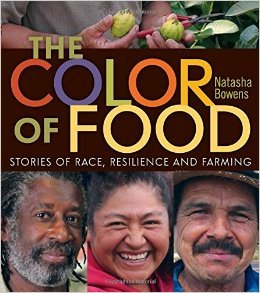
[We hold this space]
for the farmers, ranchers and butchers who’s presence we’re not aware of but who aren’t “gone” or “disappeared” or “eradicated.” We lift up the ones who don’t have websites, the ones who don’t do social media, the ones who don’t have volunteer days and the ones who don’t deal with the USDA. We wish them prosperity beyond measure and encourage you, the eater determined to support black farmers, to hold them in your hearts, reach out respectfully and thank them for holding it down.
We also hold this space for imagination. Imagine what it would be like to live in the world where black farmers, butchers, ranchers and artisans are well supported and connected to the people who love them and want to see them thrive. Imagine what their food tastes like and what it would mean for the pedigree of your food to extend to the farmer. Imagine if “Cage Free” meant “grown by workers making a fair wage” and “Organic” meant “supporting environmental and economic justice in communities of color.” Imagine the taste and smell of that world? What is it seasoned with? What tools and resources do we have to create to support that vision? What of those things do we have already? Who among our kindred do we know that can help us put the pieces together to make it happen?
I hope I gave you a bunch to chew on.
Sincerely,
Ask A Farmer
Like what you’re reading? Want answers from Good Sense Farm? Email thoughts and questions to [email protected].
Post link
I met Aleya Fasier hunched over sweet potatoes growing stubbornly in hard-packed earth under a sky that held history. There weren’t many words exchanged that day–mostly just weeding–or that fall–just digging, weighting and sighing. What I did pick up on was that Aleya was a person who did everything with intention. Since that day, Aleya has poured her heart into that same soil, left her mark on the historical record under that same sky and the results have been remarkable. And that is where we’ll start.
Prepare yourself and give thanks for the words of black, queer, womanist, futurist, ecologist, artist, educator, farmer Aleya Frasier–co-founder of Black Dirt Farm and a revolutionary warrior for black food security.
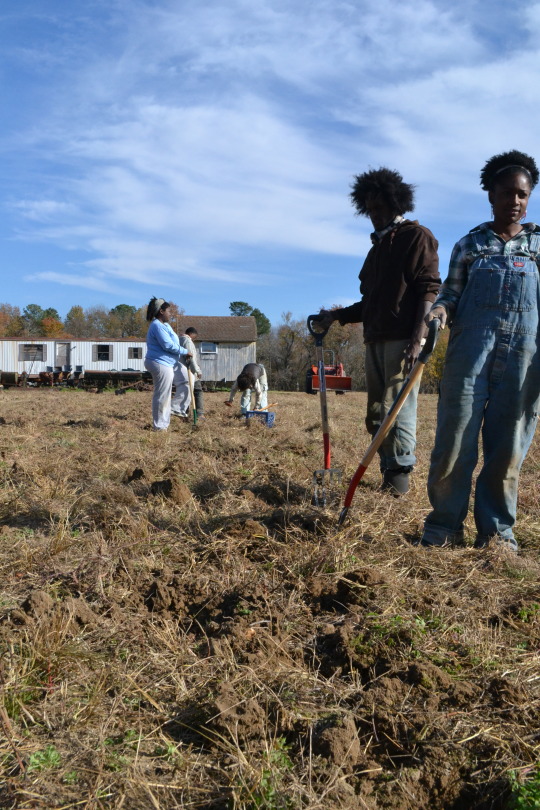
GSF: Who are you and what is your superpower?
AF: I am one of many queer, biologically active, radical molecules of melanin chilling on your amygdala guiding your primal instincts. And our superpower is activating your superpower. This is done through hormonal and vibrational synchronicity with other radical melanated molecules. I was formed under libra skies so by definition my vibration brings balance to different sides of the equation and works to bring organic and inorganic reactions to equilibrium. Our superpowers activate at the intersection of entropy and equilibrium which is pretty much at all times and space continuums, but they are strongest when connected to the land as space and now as the time. When people step foot on the farm the serotonin in the soil mixed with the ancestors in the air and UV ray excitation of my electrons and my subtle vibrations in their cells allows caverns in the mind to open that have been previously filtered and neurons to connect in ways that they haven’t before. Mitochondrial dna is stirred awake and its knowledge from your uterine having ancestors that has been passed down since the beginning of her story is realized. Through black dirt under fingernails, melanated work under the sun and calloused hands peoples superpowers and ancient rhythms are germinated approximately 3 weeks after the last frost. so you see all with melanin possess this ability at varying frequencies. and then we do it again.
GSF: You are a disciple of AfroEcology and gather folks to celebrate and mobilize around Afro-ecological practice. First of all, what is AfroEcology? How is it, as you say “a perfect counter attack to white supremacy capitalism and patriarchy.” ?
AF: Afroecology is a form of art, movement, practice and process of social and ecological transformation that involves the re-evaluation of our sacred relationships with land, water, air, seeds and food; (re)recognizes humans as co-creators that are an aspect of the planet’s life support systems; values the Afro-Indigenous experience of reality and ways of knowing; cherishes ancestral and communal forms of knowledge, experience and lifeways that began in Africa and continue throughout the Diaspora; and is rooted in the agrarian traditions, legacies and struggles of the Black experience in the Americas.The nature of the Black Experience in America, and in the Americas, has always been and will be, intimately, tied to the land and our agrarian identity. As said by Harry Haywood in Negro Liberation in 1948, “The Negro Question in the United States is Agrarian in Origin.” To draw upon this agrarian legacy, we, at the Black Dirt Farm Collective, felt it was important to introduce the concept of Afroecology – not as a definition but as a place to stimulate discussions on the intimate connection between us as people and the land. Far too often, people of color and Black Folk succumb to using words, theories and concepts that do not directly speak our language nor speak to our experience of reality. All the while, these very concepts, like organic farming, permaculture, etc. come from and stem from our ancestry, and current practices as people of the land and our organizing legacies. As part of the liberation struggle, we recognize the need to create political ideologies, and cultural theories, concepts and practices to help clarify certain aspects of reality, so as to transformation the material and social conditions of reality. We present Afroecology as part of that process. Afroecology is a call back to the land that is awaiting our return. It is a living breathing process of decolonization that is built upon the black experience of the indigenous (africans) becoming indigenized(diasporic africans). Our indigenous reality cannot be recreated but it can also not be forgotten because WE as indigenized peoples have the unique ability to create and determine our reality using our wildest imaginations and ancestral knowledge as fuel. Afroecology is above all else a process of reclaiming our identity as communal beings connected to every aspect of our ecosystem and about reclaiming knowledge from the base!As a practice, afroecology builds from agroecology in its way of teaching how to work in harmony with nature to feed people. On the farm, we try our best to recycle nutrients, biomass and raw materials to achieve a balance in the flow of inputs and outputs. We promote diverse microcosmic and macrocosmic relationships from soil bacteria and fungi to the people who visit the farm and we ultimately treat the farm as an extension of our beings ,nurturing its recovery and decolonization much as we do our own, through natural inputs, spiritual practices, art and balance.
GSF: Describe a mythical seed variety that you would cultivate if you could.
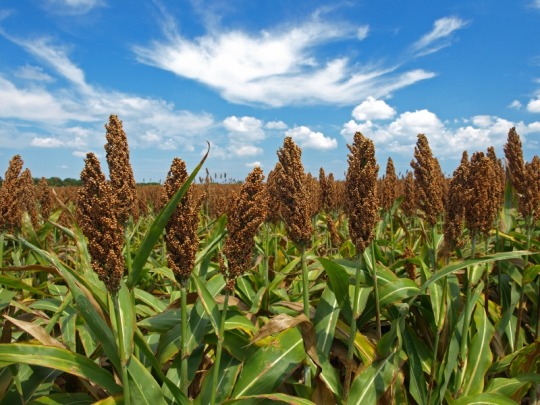
AF: I like to think that every seed variety is mythical in the magical sense and I play out their magical path in my daydreams. If you truly tell the story of a single seed from its origin to your farm, the story would be as colorful as any spiritual text. I will share about a seed variety that to me epitomizes myth and magic and the power of mitochondria. Sorghum is a grain indigenous to Northeastern Africa with earliest known records from the Egypt/Sudan border region from 8000 BC. It is a BEAUTIFUL monocot; its got strappy leaves, a bamboo like shoot and parallel veins; with as many powers as your imagination can handle imagining. Its seed pops sizzles and cracks in your cast iron and its cane can be pressed for sweet juice. Its seed can be threshed pounded and kneaded into nourishment for your baby or boiled and baked into your favorite recipe. It body has the powers to convert sunlight into energy in unique efficient ways and its roots go deep to ensure it survives in drought too. It’s powers allow it to serve as money in the common market place, more valuable than cattle at times for the women selling their beers made with sorghum strains specific to their mitochondrial lineage. Strains that have in a way co evolved with the women and families who cultivate them, the people who bear its callouses, the people who could not part with it when captured and stripped away from their own gardens. Strains that survived in afros across the middle passage that were planted and transplanted and harvested and sowed and reaped and seeded and then again and again until yesterday, today and tomorrow when I harvest our sorghum from seed given to us by friends. 10 seeds now 1000 to share with them. Sounds mythical, right?
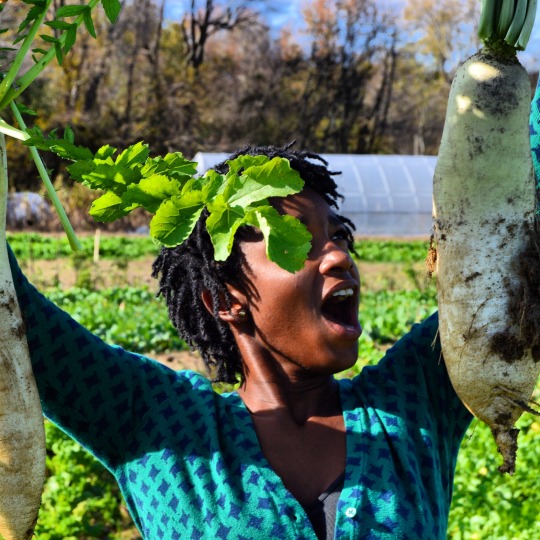
GSF: Magical, indeed! So tell me, what’s the dirt on Black Dirt Farm? How can people support? Winter plans?
The dirt is not even black on Black Dirt Farm haha we are frontin! We have this kind of cool light brown sandy loam texture that grows amazing root crops but turns into cement when baked under the hot sun. But on the flip side, a farm is very rarely the effort of solely one or two people.Thus, Black Dirt Farm is collectively cared for by a strong network of farmers, friends and families.A core group manages the day to day operations of the farm, the distribution and marketing as well as coordinating and participating in trainings and events around agroecology, food sovereignty and regenerative economics with black and brown folks from all over the diaspora. We LOVE to gather with folks on the farm and to share black agrarian images and voices and to learn from our elders who are supporting the journey!
People can support by eating their veggies and by supporting our friends like you at Community Farming Alliance and Chris Bradshaw with Dreaming out Loud and Xavier Brown with the Green Scheme and Natasha Bowens author of The Color of Food and the list goes on! We will be hunkering down this winter and hopefully going to some warm places to collectively energize and create our vision for the next few seasons. A wish list of support would be a website designer, a logo designer, a farm truck or station wagon, and a yurt to serve as an agrarian library, but thats all haha.
Ya’ll heard that? If you’re feeling in a do-gooding mood, do something for a farmer. They’ll make sure you eat good.
Thanks for reading and stay on top of Aleya’s awesomeness on her instagram or the Black Church Food Security Network’s twitter!
Post link

